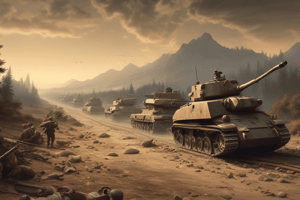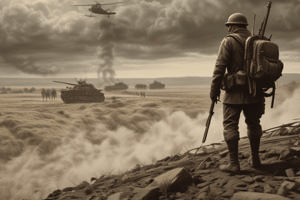Podcast
Questions and Answers
What was the primary consequence of the complex system of alliances between European powers?
What was the primary consequence of the complex system of alliances between European powers?
- The reduction of military forces and the promotion of peace
- The formation of a unified European government
- The colonization of Africa and Asia
- The escalation of a small conflict into a larger war (correct)
What was the primary role of women during the war effort?
What was the primary role of women during the war effort?
- Rationing food and essential goods
- Replacing men in the military
- Replacing men in the workforce (correct)
- Participating in propaganda campaigns
What was the purpose of the Paris Peace Conference in 1919?
What was the purpose of the Paris Peace Conference in 1919?
- To establish a new world order
- To promote nationalism and independence
- To negotiate a treaty to end the war (correct)
- To celebrate the Allied victory
What was the primary cause of the buildup of tensions and rivalries among European powers?
What was the primary cause of the buildup of tensions and rivalries among European powers?
What was the primary purpose(s) of censorship during the war? Choose all that apply.
What was the primary purpose(s) of censorship during the war? Choose all that apply.
What was a major consequence of the Treaty of Versailles?
What was a major consequence of the Treaty of Versailles?
What was a key provision of the Treaty of Versailles?
What was a key provision of the Treaty of Versailles?
What was the significance of the Battle of the Argonne Forest?
What was the significance of the Battle of the Argonne Forest?
What was the role of the U.S. Army in the Battle of the Argonne Forest?
What was the role of the U.S. Army in the Battle of the Argonne Forest?
What was the location of the Argonne Forest?
What was the location of the Argonne Forest?
Flashcards are hidden until you start studying
Study Notes
Causes of the War
- Imperialism: European powers competed for colonies and territories, leading to tensions and rivalries.
- Nationalism: Ethnic and national groups sought independence and self-determination, causing conflicts.
- Militarism: The buildup of military forces and the glorification of war contributed to an atmosphere of aggression.
- Alliances: The complex system of alliances between European powers (e.g., Triple Entente and Triple Alliance) created a situation in which a small conflict could escalate into a larger war.
- Assassination of Archduke Franz Ferdinand: The murder of the Austro-Hungarian heir by a Serbian nationalist in June 1914 triggered the war.
Home Front
- War Effort: Governments mobilized citizens, industries, and resources to support the war effort.
- Rationing: Food, fuel, and other essential goods were rationed to ensure fair distribution and conserve resources.
- Women's Roles: Women increasingly took on new roles in the workforce, replacing men who had gone to fight.
- Propaganda: Governments used propaganda to boost morale, promote patriotism, and demonize the enemy.
- Censorship: Governments censored media and communication to control the flow of information and maintain secrecy.
Treaty of Versailles
- Paris Peace Conference: The treaty was negotiated at the Paris Peace Conference in 1919, attended by representatives from over 30 countries.
- Key Provisions:
- Germany accepted responsibility for causing the war and agreed to pay reparations.
- Germany's military was limited in size and firepower.
- The League of Nations was established to promote international cooperation and prevent future wars.
- Consequences: The treaty's harsh terms and imposition of blame on Germany contributed to widespread resentment and economic instability, ultimately contributing to the rise of Nazi Germany.
Argonne Forest
- Location: The Argonne Forest is a region in northeastern France, near the Belgian border.
- Battle of the Argonne Forest: The battle, fought from September 26 to November 11, 1918, was a major Allied victory and a turning point in the war.
- American Forces: The U.S. Army played a significant role in the battle, with over 1 million soldiers participating.
- Casualties: The battle resulted in heavy casualties, with estimates suggesting over 100,000 soldiers killed or wounded on both sides.
Studying That Suits You
Use AI to generate personalized quizzes and flashcards to suit your learning preferences.




